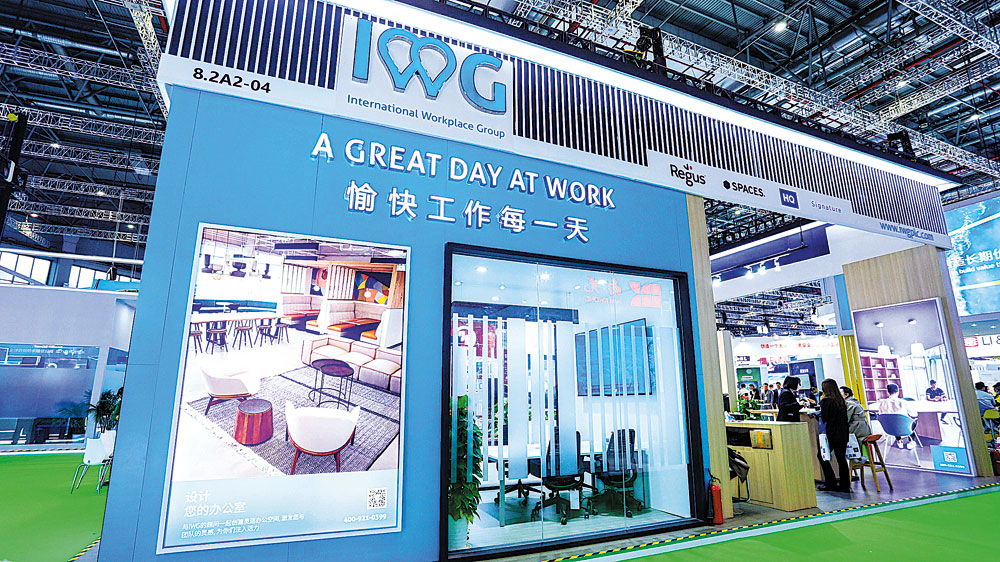IWG meets growing hybrid working trends
By ZHONG NAN | China Daily | Updated: 2022-06-27 08:41

With the COVID-19 pandemic pushing many businesses to adopt remote work practices in the past two years across China, International Workplace Group, the world's largest serviced office company by sales revenue, aims to quadruple its business size in the country over the next three years, said a senior executive.
As the London-listed company plans to expand its global network by more than 1,000 new locations this year, Edward Hu, managing director of IWG China, said the group has discovered a tremendous increase in demand for hybrid working solutions since the outbreak of COVID-19 in China, from freelance employees, corporations and the real estate industry as a whole.
Hybrid working solutions refer to a group of workers that are distributed across various locations, from traditional offices and factory spaces to remote locations, including within employee homes. Such a model offers employees flexibility and choice and has driven new approaches to agility, collaboration and ways of working in the past two decades, especially in developed markets.
Under its service framework, IWG's customers can get access to the firm's wide network of locations, with various plans available for clients to opt from, giving employees much-needed flexibility on geographical terms.
In addition to increasing the density of its network in top-tier cities and key regions including Shanghai, the Yangtze River Delta region and the Guangdong-Hong Kong-Macao Greater Bay Area, IWG, the owner of the Spaces, Signature and Regus brands, plans to gradually move its focus to more second and third-tier cities to meet growing demand.
Boasting a wide variety of industries, Shanghai and the Yangtze River Delta region unsurprisingly dominates the country's flexible workspace market in terms of the overall supply figures and urban regenerations, he said.
IWG partnered with the Hong Kong-based retail and office developer Hysan Development Co Ltd in August 2021, forming a joint venture and granting it the exclusive right to operate all IWG brands throughout the GBA. The JV has set goals to expand the network up to 100 locations in the next five years.
According to IWG's GBA research survey conducted in May this year with 2,000 participants, a total of 70 percent of respondents believe hybrid working helps them better manage their working hours and 76 percent are more likely to apply to a company that offers a flexible or hybrid working policy.
"Additionally, we have seen an increase in demand for hybrid working in northern China. In 2021, IWG introduced flexible office centers in Shenyang, Tianjin and other cities, making a positive impact on the regeneration of urban areas," Hu said.
After working for a United States-based company that allows its employees to work from home (WFH) one day per week many years ago, the executive recalled that Western countries have long been adapted to the WFH trend that began roughly two decades ago.
"Nowadays, China's younger generations like millennials (born in the 1980s and 1990s) and Generation Z(born in the mid-1990s to early 2010s) value more freedom and comfort at workplaces. They see hybrid working, including WFH, as an essential perk when searching for new jobs," he said.
Entering the Chinese market 27 years ago, the Switzerland-based group runs workspaces in 120 locations across 30 cities and regions, and its average occupancy rate of flexible workspaces in China achieved record growth in 2021, surging 21 percent on a yearly basis.
Hu said IWG will continue to form partnerships with property owners, investors and entrepreneurs, including hotel owners, transport operators and businesses in other sectors, to boost its presence in more lower-tier cities throughout China.
Supported by over 10,000 employees, IWG currently provides services to more than 8 million people and their businesses, such as Microsoft Corp, Uber Technologies Inc and Nippon Telegraph and Telephone Corp across the world.
As China has already introduced a number of policies to stabilize the job market and help micro, small and medium-sized companies seek new growth points, demand for both hybrid working solutions and coworking spaces will soar in the coming years, as an innovative, efficient and flexible way of working. The abundant community resources have drawn the attention of Chinese companies, said Guo Xin, a marketing professor at Beijing Technology and Business University.
"Such business models will bring about a variety of resources and cooperation opportunities for firms. They cover retail business, finance and supply chains, and will accelerate the growth of entrepreneurial and innovative startups," she said.
























